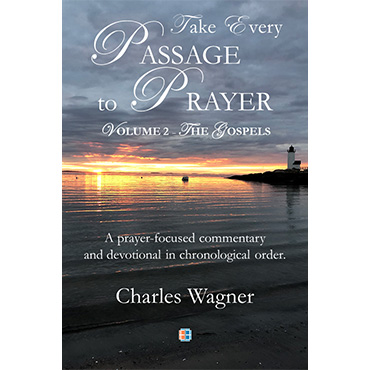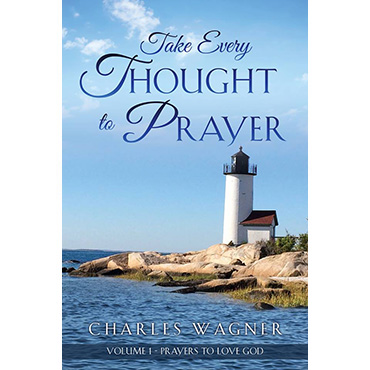The Gramazin Blog

Zechariah, Elizabeth, and Mary
Take Every Passage to Prayer - Volume 2, The Gospels
Friday May 24, 2024
Luke 1:5-80
Father, it had been four centuries since the Israelites had last heard from You. Men and women of faith continued to believe in Your promises for a Messiah to come. Father, in those times in my life when You seem distant to me, please help me to remain strong in my faith. Please help me to remain in Your Word and that You will speak to me through Your Word and that I will hear Your voice and feel the comfort of Your presence. Father, please help me to have a daily heart of repentance, praying continuously throughout the day. Help me to pray for Your Kingdom, for my nation, for my neighbors, and for my walk with You. Help me to obey all of Your commands; not in an attempt to earn salvation, but out of my deep thankfulness for what Your love has done for me. Use me to lead many people to repent of their sin and to turn their lives back to God. Father, please forgive me of my doubt and help me to doubt You no more. It is clear that ministry is taken away from those who doubt Your Word. I want to be the kind of man who has 100% confidence 24/7 that Your Word is true, and Your promises are certain. Please give me the kind of faith so that my service to You is not derailed by changing circumstances or sudden emotional storms. Father, Mary’s character is a testimony to me. I ask that You work in my life so that these truths about her can be said about me. Father, there is nothing about me that is worthy of praise. It is what You do to transform me that is praiseworthy. Please change me to Your delight and pleasure and may my transformation touch lives for Christ, even at my advanced age. Father, I pray for pregnancies across our nation, that the precious children who You are knitting together in wombs will be welcomed into our world by adults eager to love them. Father, please help me to be the kind of man who celebrates when the heartfelt prayers of other believers are finally answered to their joy and thanksgiving. Finally, help me to grow spiritually and to become strong in the Holy Spirit. Give me a humility that repels the desire for personal glory but seeks only to do the work of the Kingdom. Amen.
Father, the last time the Jews of the 1st century had heard from You, prior to the events of this passage, was when the prophet Malachi wrote in 432 BC. He concluded his prophecy by warning of a day of judgement, when all wrongs will be punished, and the wicked will be consumed by fire. Before that judgement, Malachi promised that the prophet Elijah (John the Baptist) and the Sun of Righteousness (Jesus Christ) will come, bringing grace, salvation, and healing in His wings. He will bring peace into families and lead entire families to peace with You.
In the meantime, Malachi told the people not to forget the law of Moses. We have in the passage in Malachi a reference to Jesus, Moses, and Elijah, the same three who will be transfigured in Matthew 17:3, linking the last prophecy of the Old Testament to Jesus’ ministry.
Why would Malachi instruct the people not to forget the law of Moses? It would be over 400 years between Malachi’s promise and the events of this passage. You were silent through all those years, with respect to prophetic voices. During these four centuries, the nation of Israel suffered under the occupation of Persia. The Greeks conquered the Persians and Hellenism swept through the land, bringing Greek culture, language, and customs into the region. The Jews rebelled from Greece and gained independence. However, they were conquered again by the Romans in 63 BC. The Romans installed Herod, an oppressive tyrant, as the king of Judea. At the time of the coming of Jesus, the people were longing for a political Messiah to give the Jews independence once more.
As the centuries passed, the people held on to their traditions. The work of the temple was split into 24 divisions (teams). Each team ministered for a week twice a year. A man named Zechariah belonged to the Abijah team (1 Chronicles 23-24). According to this passage, it was his turn to burn incense on the altar of incense in the Holy Place of the tabernacle (Exodus 30). The altar was cleansed once a year, on the Day of Atonement, with the blood of a sacrifice. The altar was adjacent to the veil that separated the Holy Place from the Holy of Holies. The incense was to be carefully prepared and burned each morning and at sunset each day.
Exodus 30:10 tells us that the altar of incense was most holy to You. Your Word tells us that the incense was symbolic of the prayers of Your people (Psalm 141:2, Revelation 5:8). Genuine prayer comes from a repentant heart and such a heart is precious to You (Psalm 51:17). However, before our prayers can be accepted by You, we need to be cleansed of our sin. The sacrifice on the Day of Atonement that cleansed the altar was symbolic of the perfect sacrifice of Your Son, Jesus Christ, who washes away our sin so that our prayers will be acceptable to You. Like the altar was always near the mercy seat of the Ark in the Holy of Holies, so is Jesus Christ always near You, bringing our prayers before You in His name. Through faith in Christ, we can now enter Your holy presence (Mark 15:38, Hebrews 4:16, Hebrews 10:19-23).
Therefore, burning incense on the altar in the Holy Place was an incredible honor for Zechariah, a perhaps once-in-a-lifetime experience that he looked forward to for years and would reminisce about until his death. He probably could not sleep in the days leading up to it, afraid he might do something wrong as he performed his duties, fearful of Your wrath as well as the potential humiliation of such an error with the “assembled worshipers” watching him and praying outside.
This passage informs us that Zechariah was an exceptionally godly man. How is godliness defined? The text tells us that Zechariah, and his wife Elizabeth, who most likely came from the priestly tribe of the Levites since she has been described as being of the daughters of Aaron, were faithful to obey all of Your commands and ordinances. I can imagine Elizabeth’s heart was also swelling with joy as her husband enjoyed such a high honor. Father, please let it be said of me that I am a man who obeys all of Your commands.
Zechariah walked into the temple; his heart raced with the significance of the moment. His mind rapidly rehearsed all that he needed to do and how he should do it. Suddenly, the unexpected happens. An angel appeared to him, standing to the right of the altar, and Zechariah became terrified. I can imagine that his first thought was that he had done something wrong and now the wrath of God was upon him (2 Samuel 6:6-7). Zechariah had imagined for years what this moment would be like, but he never imagined encountering an angel.
The angel calmed him.
“It’s ok. Relax. You are fine. The Father has been hearing your prayers, and the prayers of your wife Elizabeth. He knows you have wanted to have a child. I’m here to tell You that the Father has decided to give you the child you long for. Yes, even at your advanced age. You are to call him John. However, he is not going to be an ordinary baby.
- He will be miraculously conceived and delivered even though Elizabeth has already experienced menopause.
- He will cause you and Elizabeth, as well as many others, to rejoice.
- He will be great (important, significant) in the eyes of the Father.
- He will be given the Holy Spirit, even as a child in the womb.
- He will lead many people to repent of their sins and turn their lives back to God.
- He will be the Elijah referred to in Malachi 4:5-6, preparing people’s hearts for the coming of the promised Messiah.”
Father, Genesis 6:5 tells us that the thoughts of our sinful nature are evil and wicked all the time. Zechariah is not a perfect man. He still has his sinful human nature. Even in the midst of this incredible moment, where an angel has been sent to tell him, a man who pleases God by his heart for righteousness, that he will finally have a son and that son will be incredibly special, his sinful nature reveals itself. He doesn’t express gratitude. No, he expresses doubt.
“Uh, I find this hard to believe, angel. It is impossible because Elizabeth is now an old woman.”
The angel responds:
“Do you realize who you are contradicting? I am Gabriel, the one who literally stands in the presence of God. It was none other than God the Father Almighty who gave me this message to bring to you to comfort you and to give you joy. How dare you challenge me? For your act of rebellion, I am now taking away your voice. You will get it back on the eighth day after the baby is born.”
The clock was ticking. Zechariah was taking more time inside the temple than was usually required to burn the incense. People in the crowd were wondering what was going on. Finally, he emerged from the temple.
“What happened in there, Zechariah?”
However, Zechariah could not speak, though he tried. The first thoughts of everyone in the crowd was that something miraculous had happened inside the temple. Nothing extraordinary had happened in the temple for over 400 years. The people must have been dying of curiosity.
Zechariah returned to the temple on other days to burn incense and complete his tour of duty. Though his world was turned upside down having met Gabriel, he was still faithful to his calling to serve in Your temple.
When his work was finished, Zechariah returned to his home in the hill country of Judea, southeast of Jerusalem. After suffering the shock that her husband returned home without being able to speak. Elizabeth was shocked all the more when Zechariah communicated, probably through writing, what he had been told by Gabriel.
“My dear wife, you are about to become pregnant. The angel told me. I lost my voice because I doubted him. Please believe that this is true.”
Elizabeth believed her husband. She believed the message from God. She was grateful and thankful that her shame of being a childless woman in the culture would soon be over. She thanked God for caring for her feelings. A short time later, the couple went to bed and conceived the child who will become John the Baptist.
Father, Your Word tells us that a grateful and thankful Elizabeth, ecstatic that she will no longer be shamed for being childless, went into seclusion for five months, but it doesn’t tell us why. I have several thoughts:
- She wanted to reflect on Your goodness to her and on Your goodness to humanity, sending us the long-desired Messiah and calling her son to be the Elijah of Malachi 4. She wanted to enjoy a season of confession, repentance, and worship.
- She didn’t want to be distracted by the usual attention given to a pregnant woman. Perhaps she didn’t want all the advice she will be given by people who don’t understand who this child is. After all, later in the chapter, these same people will consider themselves experts on what the child’s name should be.
- She was distancing herself from all of the naysayers, who were telling her “Are you crazy? You are too old to have a baby! Your baby won’t make it! You’ll die during delivery!”
- Something happened to her body that she was reluctant to show to others. Father, if it quacks like a duck, walks like a duck, and looks like a duck, it is probably a duck. Similarly, if Elizabeth had a healthy egg like a younger woman, a healthy uterus like a younger woman, was able to experience the physical challenges of vaginal delivery like a younger woman, was able to nurse the baby like a younger woman and was able to keep up with an active toddler like a younger woman, she was probably a younger woman. I hypothesize, without Biblical references to support my hypothesis, that the miracle that took place was not that an old woman survived the challenges of pregnancy and vaginal delivery but that an old woman was made younger so that she could become a mother. In either case, a miracle took place that gives You glory and praise. I theorize that Elizabeth may have hidden herself away to avoid the worldly and lustful comments many would make about her youthful appearance.
Father, Mary was a resident of Nazareth , a city to the north of Jerusalem, not far from the Sea of Galilee. She must have been an extraordinary young lady in her early teens. A study of her song in this chapter reveals her heart:
- She has genuine humility, counting herself among the lowly. She speaks of her need for a savior. She speaks poorly of the proud and arrogant.
- She has been educated in Old Testament prophecy and the stories of Your mighty works for the people of Israel. Given she was a young female whose education was not important in that culture, her learning must have come through a committed effort to ask questions about Your greatness of learned men and women.
- She had great wisdom. She stated You are to be feared. Psalm 111:10 tells us that those who fear the Lord are wise and have understanding.
- She believes You are loving and compassionate, filling the hungry with what they need.
- She is looking forward to the coming of the Messiah, the seed of Abraham.
Gabriel appeared to her as he did to Zechariah. Though Mary was also frightened, Gabriel was comforting once more:
“Mary, you are so incredibly blessed. You have found favor in God’s eyes. No other woman on earth, anywhere on the globe or at any time in history, will be able to say they gave birth to the Son of God. He will be the rightful heir to the throne of David, the much longed for Messiah, the King who will live forever.”
I believe Gabriel was not celebrating that Mary was better than all other women. Gabriel was celebrating that what will happen to Mary is something no other woman will experience in history. It wasn’t anything about Mary that was worthy of praise. It was what happened to her by Your hand that was, and is, worthy of praise.
As wonderful as Mary was, she remained a human, quick to worry about details.
“How could I be pregnant? I haven’t had sex with a man. I know I’m engaged to Joseph, but we haven’t done anything. Are he and I supposed to have sex? But that’s against Your will outside of marriage. I’m confused. How am I to become pregnant?”
Gabriel responded by telling her to relax. You would fertilize her egg through the power of the Holy Spirit. No sexual intercourse was necessary. It will be miraculous. Her baby boy is to be called Jesus and He will be the rightful heir to the throne of David, the Messiah. He will be King forever. Gabriel told her that a similar miracle had already taken place - Elizabeth, a post-menopausal woman in Judea, was six months pregnant. Nothing is too hard for God.
How did Mary respond? She believed Gabriel and surrendered her life to the gospel of Jesus Christ. “Let it be according to Your Word.” She will play the role she has been asked to play so that salvation will come to the nations.
Father, I can imagine Mary felt incredibly lonely. Who could understand what has happened to her? There was no precedent in history of a woman becoming pregnant without the contribution of a man. Everyone would think she was promiscuous and had sex outside of marriage. She will be humiliated. She needed to get away. But where to?
She wanted to be with Elizabeth. Who better for a woman impregnated by the Holy Spirit to talk with than a woman whose entire body was miraculously transformed by God so that she could give birth to a child? Mary must have begged her family to let her travel over 100 miles, over three to five days, to see Elizabeth. It is highly doubtful she made that trip alone without the support of her family. Logic suggests that she shared with her family the message she received from Gabriel, and they believed her. She was a child of honorable character.
When Mary arrived at Elizabeth’s home, the Bible reports that Elizabeth’s baby, John the Baptist, leapt in her womb. This is not the passage a pro-abortion individual wants to read. A fetus was aware of the majestic glory of another fetus that had been conceived in another woman’s body. Even though Mary was only a few weeks into her pregnancy, her baby had the soul and glory of the Son of God.
Elizabeth praised Mary and gave her encouragement that, because of her obedience and faith, millions of people from all over the world will come to faith in Jesus Christ. The two women stayed together for three months, no doubt talking about their pregnancies, their babies, their families and friends, their husbands (to-be in Mary’s case), and the blessing for all of mankind that the promised Messiah had finally come. Elizabeth must have played the role of the wise older woman who instructed the young teen on how to live a godly life in such unprecedented circumstances. As Elizabeth was preparing to give birth and Mary was entering into her second trimester, Mary traveled back home to her family in Nazareth.
There was much celebration when Elizabeth gave birth to her son. Many who loved Elizabeth, who had grieved beside her when her womb was barren, were jumping for joy that she had a baby. They suggested the baby’s name should be Zechariah, no doubt in accordance with the teasing he undoubtedly received for his virility to become a father at such an advanced age. However, Zechariah, who was the leader of the family in that culture, was true to Gabriel’s command and wrote on paper that the baby’s name was to be John.
Immediately he could speak. Led by the Holy Spirit, he praised God for the hope that the promised Messiah, foretold by the prophets and from the house of David, had finally come. He praised his little baby boy, knowing that this child would lead many out of darkness and into the light of repentance and salvation, and that he would prepare the way for Mary’s little baby, Jesus Christ, the Son of God, to bring the remission of sins to the world.
Word got around the region.
“What is going on with Zechariah and Elizabeth? Who is their baby? Is he the long-awaited Messiah? Is he Elijah? How should we respond to this child?”
Father, Your Word tells us that Your hand was on John, guarding his steps from trouble and from stepping into rebellion against You. The text says that John grew and became strong in the Holy Spirit. He undoubtedly was a young man of incredible faith and wisdom, only increasing his celebrity in the land. This kind of godly young man would flee from the crushing temptations that come with fame and run into the wilderness where he could continue to grow in his faith while in obscurity. Amen.
Footnotes
30. Having rejected that Christ is the promised Messiah, Jews still set aside a seat and pour a glass of wine at the Passover meal for Elijah, anticipating his coming as promised in Malachi.
31. Nazareth will reject Jesus and His ministry on more than one occasion.
32. It would have been impractical for a pregnant woman in her third trimester to travel over 100 miles by foot or on the back of a donkey. Now was the time to get back home.







